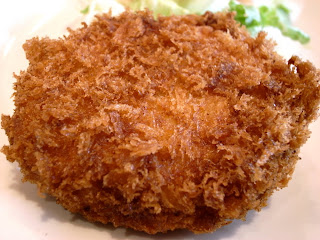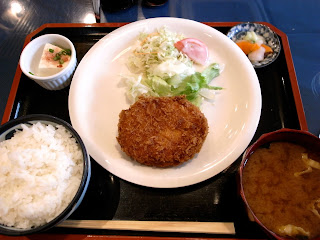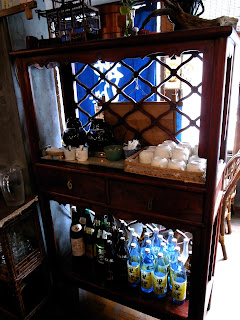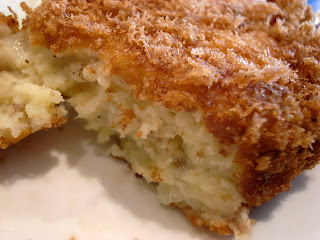The other day, I went with three former colleagues to this Izakaya (food serving pub) in Shibuya I recommend to anyone with a traveller's budget, called "
Butchigiri Sakaba" where we ended up having quite a decent amount of food and LOTS of drinks (all drinks at ¥280). It's definitely nothing more than average food but if you're into drinking, you can't go wrong here. So after moderately orgying, how flabbergasted was I when we got the check: ¥6,500, that is not even ¥1,700 per person... I mean, where is this deflation in Japan going to? "How low can you go?" like Chuck D was saying...
Deflation (though tough for business) is good in that it keeps my wallet healthy, and for a big eater like me who writes a daily food blog, it can actually be quite crucial.
So in that saving state of mind, I decided the next day to visit this new eatery in the neighborhood which serves a dirt-cheap ¥500 lunch. Only problem: when I looked at the pictures on the menu outside the restaurant, it just did not look that appetizing. So instead of going for it, I opted at the last minute for a "more expensive" Japanese restaurant "Ojaga", as this whole walk had gotten me into a local cuisine mood.

Ojaga is a Teishokuya (restaurant serving fixed menus, usually comprising a main dish, a bowl of rice, a soup and one or two little side dishes) for lunch and an Izakaya in the evening. The lady in her seventies standing in the kitchen has been cooking typical meals for half a century (simmered potatoes and meat "Niku-Jaga", mixed deep-fried seafood "Mikkusu Furai" or Japanese croquettes "Korokke" and so on) so if you're looking for authentic lunch plates, this is definitely an option.
By the way, Ojaga is a cute and rather original way of talking about the "Jagaimo", the most common potato in Japan. It is interesting to point out that the term "Jagaimo" is the abbreviation of Jagatara-Imo (Jagatara potato), where Jagatara designates the Indonesian capital Jakarta from where Dutch galleons imported the vegetable at the end of the 16th century. It is furthermore worth noting that what is today a regular in Japanese diet used to be initially grown for ornamental purposes.
Sorry, this post is going all over the place today...so back to the food review: once again, since the restaurant's name is an obvious reference to the tuberous crop and probably also to their popular simmered potatoes recipe "Niku-Jaga", one might want to try it, but I rather went for one of my childhood favorite, potatoes and meat croquette "Korokke".

As you can see, the Teishoku set came with a quite big bowl of rice, an excellent and very pungent Miso soup which tasted like an Akadashi soup (made of regular "Mame-Miso" fermented bean paste and "Kome-Miso" fermented rice and bean paste; you will often come across this soup in Sushi restaurants), a tiny Yakko (fresh tofu with grated ginger and leek) and a rather insipid Asazuke (quickly marinated pickled vegetables). Given the amount of rice, you should be full when done with this affordable ¥895 lunch.

You also get two cups a person of coffee at the self-service above, so it's a deal overall. The coffee is definitely not what you'll get at "
Bear Pond Expresso" so beware if you can't stand the typical "jus de chaussettes" (socks juice) they serve you everywhere in Japan.

The croquette was a good 10cm wide and 3cm thick, making for a densely flavored satisfying crunchy dish. The potato puree inside was sweet and combining very well with the tiny bits of ground beef and onion, and they managed to cook it almost creamy like. Definitely add some Sosu (Japanese style Worcestershire sauce) on top of the croquette, as it's a condiment that goes unbelievably well with the deep-fried breadcrumbs, and because the puree inside is quite low on salt.

Ojaga is open everyday from 11:30am to 23:00pm.
It's easy to find: take the North exit, go down the stairs, take a right, follow the street until you hit the end and it's on your right, on the second floor of a multi-tenant building.
03-3460-4188
Setagaya-ku, Kitazawa 2-35-15 2F
Click
here for a MAP
 You also get two cups a person of coffee at the self-service above, so it's a deal overall. The coffee is definitely not what you'll get at "Bear Pond Expresso" so beware if you can't stand the typical "jus de chaussettes" (socks juice) they serve you everywhere in Japan.
You also get two cups a person of coffee at the self-service above, so it's a deal overall. The coffee is definitely not what you'll get at "Bear Pond Expresso" so beware if you can't stand the typical "jus de chaussettes" (socks juice) they serve you everywhere in Japan. Ojaga is open everyday from 11:30am to 23:00pm.
Ojaga is open everyday from 11:30am to 23:00pm.

0 comments:
Post a Comment